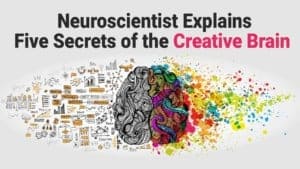This statement needn’t be said again, but here it is: a healthy brain is critical to life. Without a properly functioning brain, everything that makes you who you are will be diminished, if not eliminated. The truth is, we must take responsibility for engaging in healthy brain habits.
Despite this fact, billions of people across the globe either (a) don’t consider their brain health, (b) take their brain health for granted, or (c) don’t understand the significance of the matter.
Anyone who has received even a primary science education is aware of the brain’s importance. We’re less conscious, however, of the brain’s inner-workings. Hence, the need for articles such as this one. In this article, we’re going to focus our attention on the healthy brain habits.
But to refresh our memory on the brain’s cruciality, let’s talk some basic brain science!
Neurology 101
“The human brain has 100 billion neurons, [with] each neuron connected to 10 thousand other neurons. Sitting on your shoulders is the most complicated object in the known universe.” ~ Michio Kaku, world-renowned quantum physicist (Source)
The human brain is the central structure of our nervous system. It’s made up of the cerebrum, brainstem, and cerebellum. The cerebrum contains the cognizing part of the brain, the cerebral cortex. The cerebral cortex is comprised of four lobes, the frontal, parietal, temporal, and occipital.
The prefrontal areas of the frontal lobes are thought to enable the executive functions (EFs) of our brain. Among the EFs are – attention, inhibition, initiation, planning, self-monitoring, self-regulation, and working memory (long-term memory functions occur in the brain’s hippocampus.)
Here are some other interesting facts about the brain:
- It weighs about 3-1/3 pounds, which is the largest of all vertebrates by total body weight. This number adds up to about 2 percent of a person’s body weight, on average.
- The male brain is slightly larger than females, at 1,274 cubic centimeters to 1,131 cubic centimeters, respectively. (No correlation exists between brain size and intelligence, however. Sorry men!)
- The cerebrum is the largest area of the brain, accounting for about 85 percent of its total weight.
- The brain contains around 90 billion neurons (nerve cells) – referred to as our brain’s “gray matter.” It also includes billions of axons and dendrites (nerve fibers) – referred to as the brain’s “white matter.”
- The very high number of neurons per unit volume in the human brain is thought to explain why our species is much more intelligent than any other known species.
- Connecting the neurons and permitting communication are trillions (!) of small junctions called synapses.
 Functions of the brain:
Functions of the brain:
The brain, of course, serves a multitude of critical services. Scientists organize these byproducts of the brain by region.
- Frontal lobe: Organizational abilities, behavior, emotional control, and personality.
- Parietal lobe: Ability to understand the relationship between objects and space (“spatial ability,” written and spoken language.
- Occipital lobe: Controls vision
- Temporal lobe: Controls comprehension, memory, and speech
- Brain stem: Regulates alertness level, blood pressure, and state of consciousness.
- Cerebellum: Houses the fine motor skills, enabling physical coordination.
- Grey and white matter: Grey matter analyzes information; white matter enables the communication between grey matter areas.
6 of the Healthiest Brain Habits
Now that we’ve established some brain basics let’s discuss how we can maximize our brain health. Without further ado, here are six of the healthiest brain habits, according to science.
1. Eating brain-boosting foods
“You are what you eat,” as the old saying goes – and this applies to your brain as well. Here are some of the best foods for brain health.
Oily fish:
Oily fish is an outstanding source of omega-3 fatty acids, which are crucial for proper neuron development. Fatty acids help to synthesize a protective sheath around neurons called myelin, which is essential to proper communication between nerve cells. Additionally, per a 2017 study, omega-3 fatty acids improve blood flow to the brain.
Blueberries:
Affectionately referred to by some as “brain berries,” blueberries are among the best antioxidants there is. Oxidative stress contributes to brain aging and negatively impacts proper brain function. They may also help improve your intelligence.
Dark chocolate:
Now we’re talkin’! Dark chocolate is another food that is an outstanding source of antioxidants. This benefit is mostly due to the treat’s high content of cacao, which may also help to promote blood vessel and neuronal growth as well as increase blood flow.
Nuts and seeds:
Nuts and seeds are yet another source of quality antioxidants. As a bonus, they also contain a good amount of omega-3s and are a great alternative to vegetarians and vegans who abstain from fish. Studies show that nuts and seeds may help to slow age-related cognitive decline.
2. Developing equanimity
Believe it or not, there are people out there who bring a sort-of even-keeled mindset to just about every situation. These folks aren’t easily ruffled and manage to both demonstrate a certain unflappability while invoking a sense of calm in others as well.
Why is this important? Well, not only is it a much more peaceful and engaging way to live, an equanimous state of mind is marvelous for brain health.
High cortisol (the “stress hormone”) levels link directly to impaired memory. Chronic stress may also shrink areas of the brain. Fortunately, due to the brain’s impressive resilience, we can “reverse” this process. The best way to do this is through meditation, which, according to brain experts, “…rewires the brain and [improves neuroprotection]…which predicts longer life expectancy.”
3. Doing moderate exercise
Contrary to what some of the health nuts say, you needn’t develop the endurance of a triathlete to improve your health significantly. Research shows that even moderate physical activity – whether it’s through biking, jogging, brisk walking, or light weightlifting – may contribute to enhanced cognitive performance.
The reason why exercise is so effective for the brain is that physical activity releases brain-derived neurotrophic factor (BDNF), which repairs neurons and strengthens the connection between neurons.
Light exercise also helps to release endorphins, which can lift your mood. Finally, aerobic exercise (e.g., jogging, running, or brisk walking) increases blood flow to the brain and reduces the risk of brain damage from both hypertension and high cholesterol.
 4. Doing stimulating activities
4. Doing stimulating activities
The brain is not some static entity – it’s always evolving, for better or for worse.
It wasn’t long ago that neuroscientists believed things like intelligence and brain structure were fixed, unchanging. We now know that this is untrue.
Neuroplasticity, a term that speaks to the malleability of the brain, is a relatively recent phenomenon that demonstrates – in no uncertain terms – that the brain is changing throughout life.
Enhancing the brain for the better requires that we put it to work. The best way to do that is by stimulating the brain’s processes through cognitive challenges.
David S. Knopman, a clinical neurologist, says, “…higher cognitive activity [bestows upon] the brain a greater ability to endure the effects of [things like disease better] compared to a person with lower cognitive engagement…”
What kind of activity? That’s up to you.
The important thing is to engage your brain in such activity regularly. Making this a daily habit is probably best. And remember, it must be challenging, but not to the point of being undoable.
5. Making social connections
We’re all well aware by now that humans are social animals. We live and work in groups with very few exceptions.
Evolution has hardwired this need for connection into the brain’s workings. One example of this evolutionary byproduct is the effects of everyday conversation. Research shows that verbal interaction is crucial for the brain’s development, including in areas such as attention, memory, social awareness, speech, and thinking.
Social connections may even help to protect against neurodegenerative disorders like Alzheimer’s. Per a study published in the American Journal of Public Health, interaction with others may safeguard the brain against dementia.
6. Sleeping well
Sleep is a critical part of good brain health. Inadequate sleep – a problem that the Centers for Disease Control and Prevention (CDC) calls an “epidemic” contributes to psychological as well as physiological illnesses.
According to an article published by Scientific American, among the critical roles that proper sleep plays in the promotion of brain health are:
- consolidation of long-term memory
- elimination of toxins and dead brain cells
- replenishment of brain energy (glucose)
- support of learning and memory.
- regulation of mood
- stabilization of appetite
- maintenance of sexual drive (libido)
While the recommended sleep duration may vary by source, most evidence appears to suggest that 7 to 9 hours of quality shuteye is the most beneficial to mental and physical health.

Final Thoughts on Trying These Healthy Brain Habits
So give these healthier brain habits a try. You have nothing to lose for trying. And, you will likely feel sharper and in a better mood very soon.
The post Science Explains 6 of The Healthiest Brain Habits appeared first on Power of Positivity: Positive Thinking & Attitude.
【Top 10 Malaysia & Singapore Most Beautiful Girls】Have you follow?
